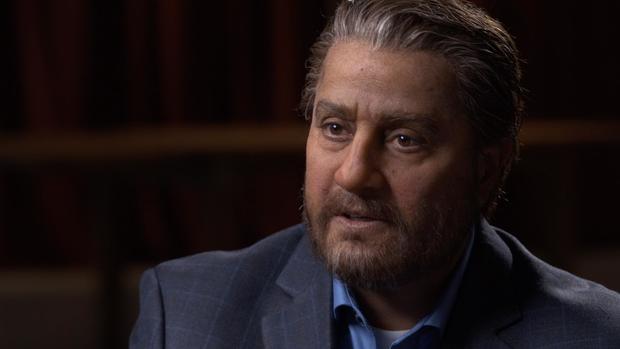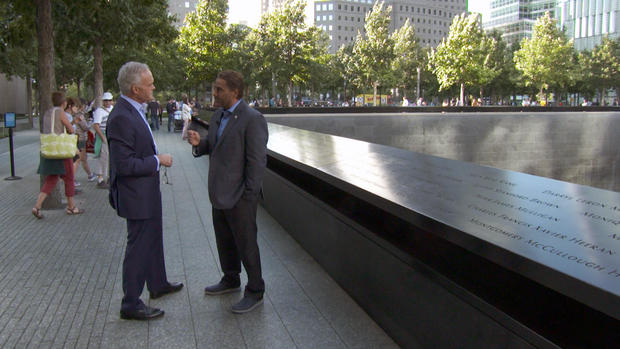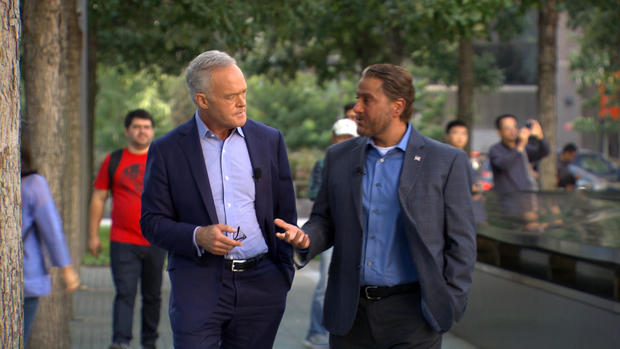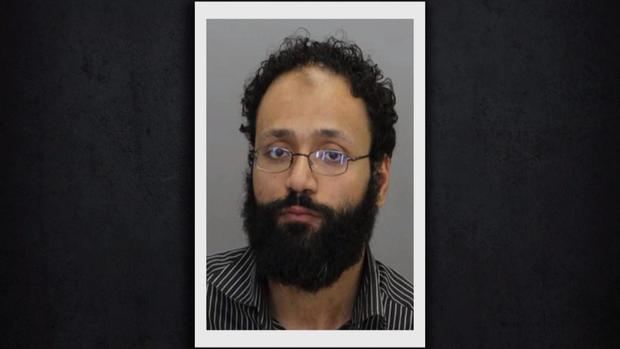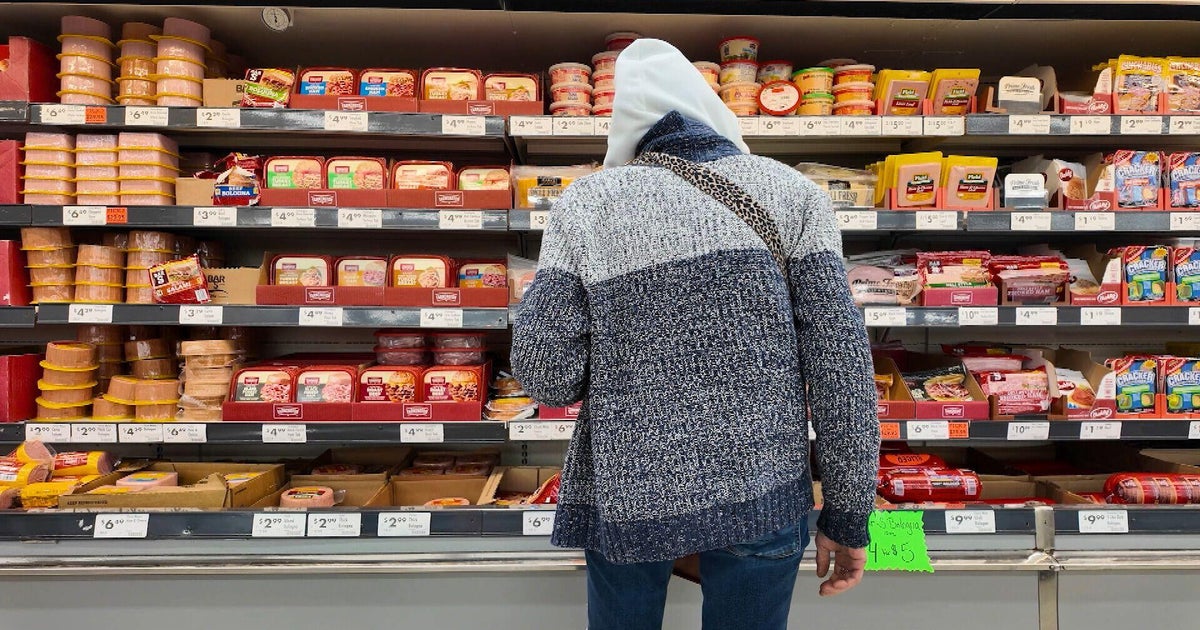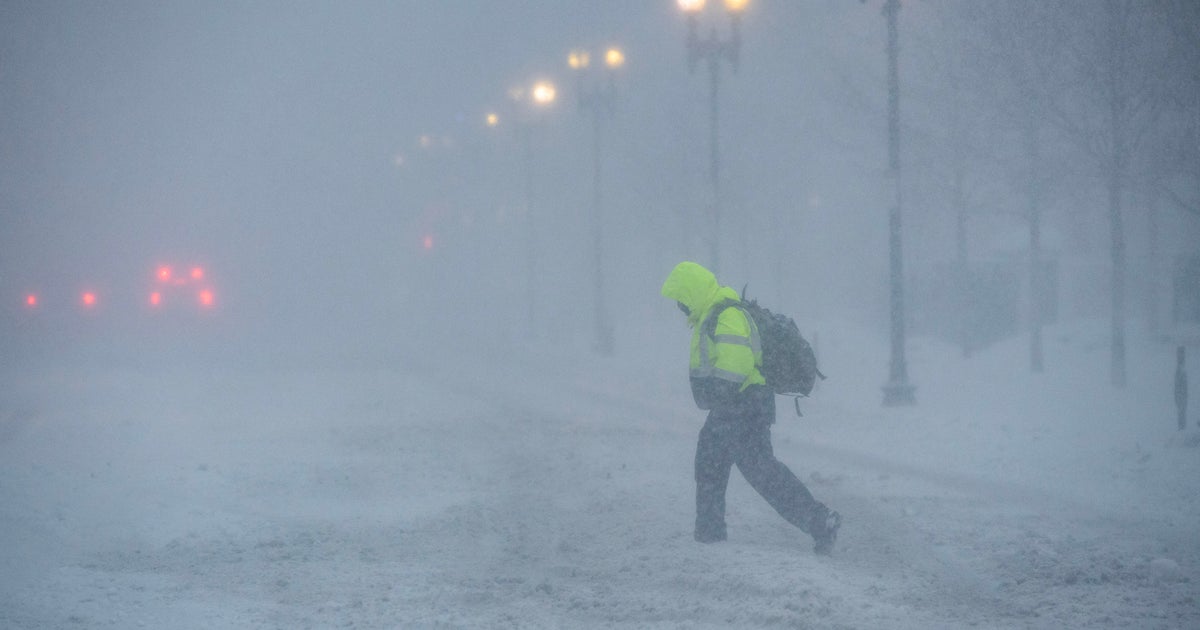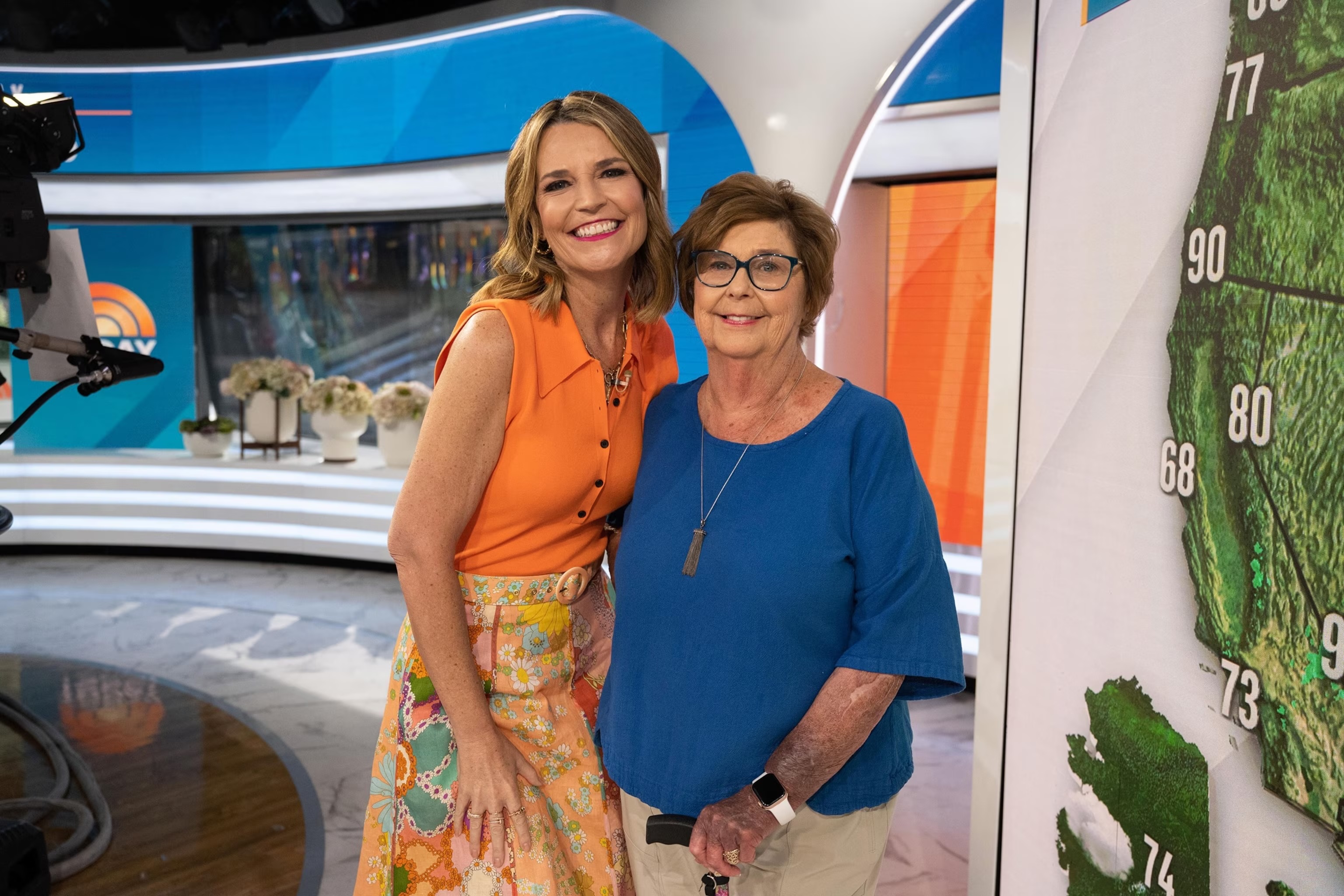Inside al Qaeda: Living and working with terrorists
Tonight, an unprecedented interview with an undercover FBI operative who secretly lives and works among the terrorists of ISIS and al Qaeda. His name is a national secret. But in 2012, al Qaeda knew him as Tamer Elnoury. They thought he was a wealthy Arab-American with seething anger at the United States. But as we first reported in October, in reality he had dedicated himself to the war on terror the morning of 9/11.
Tamer Elnoury: I remember thinking, "Please, God, don't let this be a terrorist attack. Please, God." And that's how naive I was. That's how naive we all were at that time.
Tamer Elnoury, one of his many aliases, immigrated from Egypt as a child, and was raised in New Jersey in a traditional Islamic home.
Tamer Elnoury: We're not at war with Islam. We're at war with radicals. I am a Muslim. I am an American. And I've been serving my country for 22 years and counting. And I am appalled at what these animals are doing to my country while desecrating my religion.
Devoted to Islam and America, comfortable working alone amid killers, he was a rare find for the FBI's undercover counterterrorism group.
Elnoury spent 12 years as an undercover cop before being recruited by the FBI. He is employed by another law enforcement agency but has been assigned to the Joint Terrorism Task Force in New York, where he works undercover for the FBI's National Security Covert Operations Unit.
Tamer Elnoury: It's called the National Security Covert Operations Unit.
Scott Pelley: And what do the guys in the unit call it?
Tamer Elnoury: It's not the guys, it's me. I jokingly referred to it as the Dirty Arabs group.
Scott Pelley: The Dirty Arabs group?
Tamer Elnoury: Yes.
Scott Pelley: Your bosses must have loved that.
Dark humor is part of his trade. He writes in a new book, called "American Radical," about infiltrating terrorist groups at home and abroad. He wrote the book, he told us, so fellow Americans could understand how the Islam he knows is tortured by terrorists trying to justify mayhem. We disguised him and changed his voice so he could tell us about one of the biggest investigations of his career. The target was a 30-year-old Tunisian who was working toward a PhD at a Canadian university. It was in 2012 that routine surveillance of Chiheb Esseghaier's phone calls and travels gave Canadian intelligence and the FBI reasons to worry.
Tamer Elnoury: Chiheb was talking to some really bad folks overseas. He made two trips to Iran. And a handful of other intelligence gathering evidence that was presented to us led us to believe that we needed to figure out who he was.
Esseghaier had a visa to attend an academic conference in the United States so the FBI wanted Tamer Elnoury to dangle himself as bait just in case Esseghaier was recruiting for al Qaeda.
Scott Pelley: What did you do then?
Tamer Elnoury: I crafted my legend and made myself recruitable. I wanted him to choose me. I wanted him to go to bed that night wondering what he could do to become my friend.
His legend, or false biography, was that of a wealthy Arab-American real-estate investor with a painful, private grudge.
Scott Pelley: How did you meet?
Tamer Elnoury: We met on a flight from Houston to San Jose, California.
Scott Pelley: Not by accident?
Tamer Elnoury: We met on the flight from Houston to San Jose, California.
That planned, "accidental" meeting, in June 2012, is called a "bump," as in, bumping into someone. They boarded as strangers and fate did the rest.
Tamer Elnoury: People were in his seat. People were in my seat. It was a legitimate mix up. And as I was talking to the flight attendant, he noticed that I had a long beard, that I looked Middle Eastern. And probably was a Muslim. So he poked his head over and he said, Batakalem Arabyi which means, "Do you speak Arabic," in Arabic. I said, Taba'an, Assalmu alaikum wa rahmat'Allahi wa barakatu And he looked at me and he said, Wa-alaikum assalaam wa-rahmat'Allah, "I knew it."And then the conversation proceeded in Arabic. He then turned to the other flight attendant and said, "We must sit together." He insisted. He chose me.
Scott Pelley: The whole key to the thing is to make it their idea?
Tamer Elnoury: That's correct.
Scott Pelley: What is the process that you go through to get into one of these roles?
Tamer Elnoury: It starts that morning that I'm traveling, assuming I'm traveling covertly, in alias. I take a shower and I put on, for this case, I put on Tamer's clothes. I put on Tamer's watch, his shoes. I drive Tamer's car. His wallet's in my pocket. His phone is on me. And I drive to the beach. And I sit at the beach and I talk to myself out loud like a crazy person, reciting everything there is to know about Tamer Elnoury, his company, his family, his legend, over and over.
The FBI created a history for Tamer Elnoury; an online presence, an actual office for his investment company where a receptionist answered the phone. There were ownership records, a home, fake IDs…
And, critical to the legend, there was a fake personal tragedy. Elnoury's false background said his mother died of neglect in a U.S. hospital because of anti-Muslim discrimination. That lie completed the picture of a wealthy Arab American with a reason to hate. Chiheb Esseghaier thought his new friend was 'made to order'—which, of course, he was.
For 10 months, the men drew close. Esseghaier twisted the Koran to justify attacking the West. He admitted his trips to Iran were for meetings with a senior al Qaeda leader. Surveillance showed Esseghaier was checking Tamer Elnoury's back story. And one night, in a basement in Toronto, Elnoury was grilled by Esseghaier and three accomplices.
Tamer Elnoury: "What do you do? How do you do it? Is it commercial real estate? Is it residential? What do you do when you fly here? What do you do here?" It sounded like an interrogation.
This interrogation was so sharp, Elnoury feared his cover had been blown. He analyzed the room, in case he had to escape.
Scott Pelley: But the cop within you had figured out where the exit was and had decided what order he was going to shoot the people in the room if it came to that?
Tamer Elnoury: Oh, absolutely. At that point, as you get older and slower, you realize you always go for the young ones first.
Scott Pelley: Which leads me to ask, in all seriousness, where does the courage come from?
Tamer Elnoury: I can make the argument that you're probably more in danger crossing the street here in New York City, than I am when I'm embedded in an al Qaeda cell. If my legend holds up, I am worth so much more to them, safe. They protect me more than they protect their own. Because Tamer Elnoury means access to the West.
He passed that grilling and was enlisted in what al Qaeda hoped would be its long frustrated encore to 9/11.
Tamer Elnoury: He was planning on derailing a train from New York City to Toronto.
Scott Pelley: How was he gonna do that?
Tamer Elnoury: Well, that changed multiple times. It was either, break up the tracks, use explosives the bottom line was that train was getting derailed over a bridge that has little water as possible to ensure the deaths of everyone on that train.
Scott Pelley: Was this just some kind of pipe dream?
Tamer Elnoury: No, that was his tasking from al Qaeda.
The VIA Rail train carries hundreds of passengers from New York to Toronto. In September 2012, Esseghaier, Elnoury and another man cased this bridge, near Toronto, the scene of the planned attack. As a surveillance team watched overhead, Elnoury recorded Chiheb Esseghaier explaining how the disaster would unfold.
Scott Pelley: It would seem that you have plenty to arrest Chiheb on at this point. Why does the investigation keep going?
Tamer Elnoury: Because Chiheb revealed to me that there was an American sleeper. He told me that there was an American version of him. And that although he didn't know who he was, he was told by his trainers, al Qaeda senior leadership, that they would put the two of them together when the time was right.
Scott Pelley: There was an al Qaeda American agent inside the United States?
Tamer Elnoury: That's what Chiheb believed. And I believed him.
The possibility of an al Qaeda agent in America took the investigation in a new direction. Tamer Elnoury lured Esseghaier to New York City in the hope of developing leads. Esseghaier asked Elnoury to show him the sights, including Times Square.
Tamer Elnoury: He didn't see Times Square the way a foreigner would. He saw it as an opportunity to kill Americans.
An opportunity, Esseghaier suggested, for a future New Year's Eve, when more than 100 thousand people would fill the streets.
Tamer Elnoury: Multiple explosions that were timed about five to 10 seconds apart. As one went off, he thought about where the crowd would then run to. And that's where he wanted the next bomb to go off. Maximum carnage, maximum casualties.
Scott Pelley: He expected to get away with derailing the train so that he could go on to Times Square next?
Tamer Elnoury: Exactly. Chiheb said that al Qaeda shifted gears. After 9/11, they lost some of their best minds. No more martyrdom. It was maximum casualties, minimum exposure. That was their mindset. And they didn't want to lose soldiers anymore, people with access to the West. So do you what you can and get out, hide, and do it again.
After his visit to Times Square, Esseghaier wanted to see where the Twin Towers had fallen.
Tamer Elnoury: And as he was rubbing his beard and his arm was around me, he said, "Tamer, this place needs another 9/11 and we're gonna give it to 'em." I saw red at that moment. It was the hardest time in my career to stay professional. Here I am on hallowed ground and he said that to me. At that very moment, I could feel a pen in the pocket of my jacket. I envisioned stabbing him in the eye and dropping him dead right where he stood.
Scott Pelley: You very nearly blew your cover?
Tamer Elnoury: Yes, sir. Yes, well, it's part of what we do, though. We pretend to be someone we loath while hanging out with people we hate. Maybe it was the culmination of everything that was happening, the stress and pressure of identifying the sleeper. Chiheb's rants about the West, whatever. But the point was I almost broke that night. But thankfully for the case, I didn't.
The FBI wanted more time but, in April 2013, the Boston Marathon was attacked. One week later, the Canadian government insisted on wrapping up its al Qaeda cell. Chiheb Esseghaier and the accomplice on the bridge were tried, convicted and sentenced to life. But the trail to the American sleeper, if he existed, went cold.
Tamer Elnoury: There hasn't been a day since April 22nd, 2013, when I've woken up, no matter where I am that I don't think about the American sleeper.
Tamer Elnoury's book, American Radical, was cleared for publication after an FBI review. He has stepped away from undercover work for now but he's still on the job, consulting with the bureau and training others for covert assignments.
Produced by Henry Schuster. Rachael Morehouse, associate producer.

